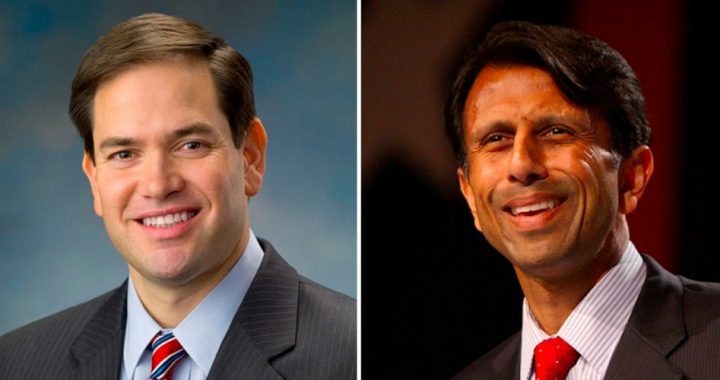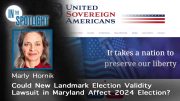
Before he ruffled feathers during his trip to Europe, Mitt Romney’s choice of a vice-presidential running mate was the favorite topic among those following the upcoming presidential election.
Many prominent and popular politicians have been mentioned as being included on the short list of those being considered for the second slot on the ticket, but two of them have drawn attention for reasons other than than their ability to help Romney defeat Barack Obama.
Florida Senator Marco Rubio (pictured, left) and Louisiana Governor Bobby Jindal (right) are very popular and have a significant number of admirers in the ranks of the GOP. Both men are considered Tea Party-approved choices and are widely regarded as “conservatives” and “populists,” thus good matches for the more buttoned-down establishment-type image held by Mitt Romney.
Lately, however, percolating up from the cauldron of the alternative press have come questions as to whether Rubio and Jindal meet the Constitution’s requirement that presidents of the United States be “natural born citizens.” Naturally, the mainstream of the conservative press have written in defense of the men’s eligibility.”
Bret Baier of Fox News, for example, reports having received e-mails from many concerned about the status of Rubio and Jindal. In a blog, Baier writes:
The Constitution requires that the president be a “natural born citizen,” but does not define the term. That job is left to federal law, in 8 U.S. Code, Section 1401. All the law requires is that the mother be an American citizen who has lived in the U.S. for five years or more, at least two of those years after the age of 14. If the mother fits those criteria, the child is a U.S. citizen at birth, regardless of the father’s nationality.
Baier, then, believes that Congress can establish through the passage of law the constitutional definition of “natural born citizen.”
Human Events blares in a headline that “Marco Rubio is a Natural Born Citizen” then goes on to explain that “anyone who is a citizen by nature of his birth is a ‘natural born citizen.’”
Jake Walker at RedState calls on no less an authority than James Madison to “prove” that anyone born in the United States is a “natural born citizen.” Of course, his argument doesn’t really rely on Madison (as such would be impossible), but turns to another man who “served with our Founding Fathers” as his primary witness. Citing a quotation attributed to 18th-century Connecticut jurist Zephaniah Smith, RedState argues that “every person owes a natural allegiance to the government of that country in which he is born. Allegiance is defined to be a tie, that binds the subject to the state, and in consequence of his obedience, he is entitled to protection.”
Fair enough, but RedState forgets a very important distinction: Americans are citizens of states, not subjects of a monarch. That is a very critical distinction that should not have escaped an author so seemingly steeped in the historical definitions of legal terms of art and constitutional construction.
In fact, definitions are a very important part of any investigation into what the Founders meant when they raised the threshold for eligibility for president to “natural born citizens” rather than leave it at the lower level required for members of Congress.
As with any of us, the words used by the Founders must be interpreted in light of the definition given them at the time they were used. For example, there aren’t many people today that would use the word “gay” to mean happy, despite the fact that such was the meaning attached to that word in years past.
Accordingly, so that we may understand just how high the Framers of the Constitution intended to set the bar for presidential qualifications, we must analyze the meanings attached to the words they used at the time those words were used, despite any changes that may have occurred in understanding across the intervening centuries.
Or, as one writer has observed, “Otherwise, written texts become as shifting and impermanent as the clouds — blown hither and yon throughout the years by those who unthinkingly read in their own uninformed understandings, or deliberately pervert the text to further their own agenda.”
Let’s start, then, with the text of the Constitution. In relevant part, Article II, Section 1 reads:
No person except a natural born Citizen, or a Citizen of the United States, at the time of the Adoption of this Constitution, shall be eligible to the Office of President; neither shall any Person be eligible to that Office who shall not have attained to the Age of thirty-five Years, and been fourteen Years a Resident within the United States.
That’s it. No finer point is put on that term in the Constitution, The Federalist Papers, or any record of the debates of the Constitutional Convention of 1787.
In the face of such a dearth of definition we could abandon the quest to understand the Founders’ intentions, or we could pause and recognize that where a word’s definition is so universally understood no additional clarification would be necessary.
That is to say, everyone in the room at the State House in Philadelphia that summer of 1787 knew what was meant by “natural born citizen,” and they felt no obligation to provide any additional insight.
For example, I don’t have to explain to readers what I meant by “summer” in the previous paragraph because everyone knows that that is the season of the year starting in June in and ending in September. So it was in 1787 with “natural born citizen.”
The next important step in our analysis is to identify the source of our Founders’ concept of “natural born citizen.” Despite the fact that RedState ridicules his importance, it is almost certain that the men who drafted our Constitution accepted Emerich de Vattel as the authority on the definition of that vital concept.
It can be claimed without exaggeration that it is Vattel’s interpretations and writings on the subject of the proper constitution of government that was most influential on the Founders of the American Republic. As a matter of fact, Thomas Jefferson, indisputably one of the lead framers of our nation’s government, ranked Vattel’s seminal The Law of Nations or the Principles of Natural Law as highly as similar treatises by Grotius and Pufendorf.
Benjamin Franklin shared Jefferson’s admiration for Vattel. In 1775, Franklin wrote in a letter:
I am much obliged by the kind present you have made us of your edition of Vattel. It came to us in good season, when the circumstances of a rising state make it necessary frequently to consult the law of nations. Accordingly that copy, which I kept, (after depositing one in our own public library here, and sending the other to the College of Massachusetts Bay, as you directed,) has been continually in the hands of the members of our Congress, now sitting, who are much pleased with your notes and preface, and have entertained a high and just esteem for their author.
Next, consider the irrefutable fact that Vattel’s interpretations of the law of nature were cited more frequently than any other writer’s on international law in cases heard in the courts of the early United States, and the Law of Nations was the primary textbook on the subject in use in American universities.
For all the foregoing reasons we are right to turn to the Swss-born Vattel’s Law of Nations for our understanding of the definition of “natural born citizen” just as our Founding Fathers did.
To that end, here are a few relevant selections from Vattel’s Law of Nations regarding the concept of “natural born citizen”:
§ 212: “Natural born citizens are those born in a country to parents who are also citizens of that country. Particularly, if the father of the person is not a citizen then the child is not a citizen either. Children cannot inherit from parents rights not enjoyed by them.”
§ 213: “While those individuals described above may be permitted to remain in the country of their birth, they are not naturally endowed with the rights of citizens.”
§ 214: “A country may allow a person born in a country to foreign parents the status of citizenship, this is called naturalization. That is a function of law, not of birthright.”
§§ 215, 216 & 217: “Children born overseas to parents who are foreigners in that country do not become natural born citizens of that country, rather they are citizens of the country to which their parents owe allegiance.”
One very astute writer ably summarized the import of Vattel’s statements:
The republican concept of “natural born citizenship” is radically different from the feudal notion of “natural born subjectship.” Under feudalism, merely being born in the domains of the King made one — by birth — a “natural born subject.” But in Vattel’s Model and Our Constitutional Republic, Citizens are “natural born” only if they are born of Citizens.
Finally, in 1787, John Jay, who later became one of the authors of The Federalists Papers, wrote the following in a letter to George Washington:
Permit me to hint, whether it would not be wise & seasonable to provide a strong check to the admission of foreigners into the administration of our national government and to declare expressly that the Command in Chief of the american army shall not be given to, nor devolve on, any but a natural born Citizen.
Accordingly, Jay’s recommendation were accepted by the Convention and became part of the constitutional requirements for executive eligibility.
Therefore, despite their undeniable appeal to many in the Republican Party and perhaps to Mitt Romney, as well, it seems that neither Marco Rubio nor Bobby Jindal meets the constitutional definition of a natural born citizen.
Photo: Sen.Marco Rubio and Gov. Bobby Jindal



